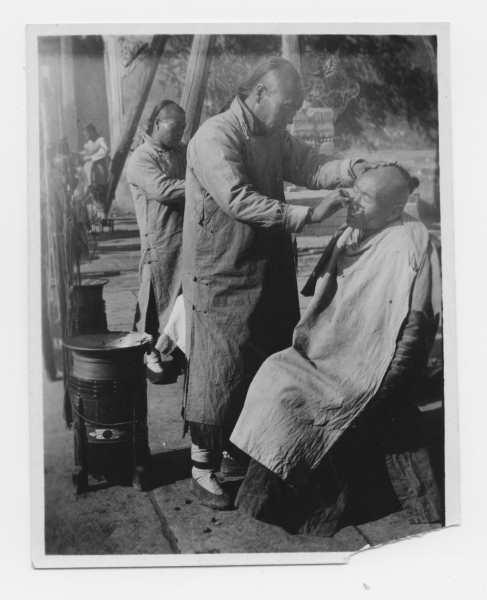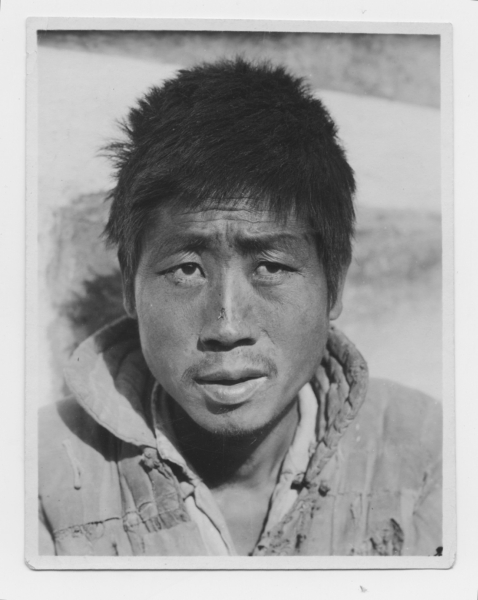Gods Men (63 page)
Henrietta tried once more. “You see, William, it is not only that they should not be allowed to starve. I believe, and Clem did, too, that unless people are fed they will rise up against any government they happen to have. The government that first understands the anger in the hearts of hungry people will be the one that wins. People feel they ought not to have to starve for any reason whatever. Dr. Feld says that Hitler's promises of food were the first steps to his power.”
William was walking restlessly about the room and she kept watching him. “The idea is so fantastic,” he was repeating. “Think of feeding the people of China! It can't be done.”
“It's got to be done,” she said. “And there are the people of India and all the other peoples.”
“Fantasy, fantasy,” William muttered.
She contradicted him flatly. “Not fantasy, William, but purest common sense. Do you know why you can't see it? Because you and Clem worked at opposite poles. He believed the world could get better only when people were better. He believed that people themselves could make a good world if only they were free from simple misery. That was Clem's faith. Yours isn't that. You think people have to be compelled from the outside, shaped, ordered, disciplined, told what to do. I don't know where your faith isâI suppose you have it, for in your own stubborn way, William, I can see you are working for the same thing Clem was.”
William was suddenly violently angry. “I deny the slightest resemblance to him! Henrietta, I tell youâ”
He raised his clenched hands and saw that they were trembling and dropped them. “Clem was a dangerous man, a menace, or might have been if he had been successful. He worked at the very roots of our nation to destroy us. I don't like to say this, HenriettaâI don't forget you are my sisterâbut now that he's dead, you had better know the truth.”
Henrietta remained calm. “Well, William, we don't understand each other. We never did. But someday it will be proved that Clem was right. That is my faith. And when he is proved right, William, you will be defeated, you and with you the Old Tiger and his beautiful wife and all the rest of your kind. How wrong that Old Empress was whom Mother continues to worship!”
“Henrietta, you're talking very wickedly.”
“I daresay.”
She was so calm, so immovably stubborn, that for a moment he felt quite sick with rage, exactly as he had so often felt when they were children together in China. But he managed to follow her into the hall and help her on with her wrap, a black wool cape. For she was determined to leave him and, so far as he could see, to leave them all. She would not allow him to tell the others that she was going.
“No use disturbing them,” she said in her short fashion.
So he let her out of the door himself and then stood at a window watching her. She did not call a cab. Instead she began to walk down the street, her bare head held very high, and the wind blowing hard and her cape flying out behind her. It was a clear night, and he could see a strip of stars above. At the far corner she stopped for a bus. He could still see her waiting there, and he would have continued to watch her except that one of those miserable creatures came shambling up to her. Under the light of the street lamp William saw her open her handbag and take out money and give it to the beggar, thereby encouraging, he thought bitterly, all such persons everywhere. He pulled the curtains together across the window and trembled with anger. He had been angry with Henrietta all his life, and with that fellow Clem!
He stood behind the curtains, thick and velvet, and summoned his old arrogant spirit. He would not suffer fools! He closed his eyes, and waited. No reassurance rose to meet his soul's demands. He wished he had not thought of Clem. He saw him again now. Inside his brain, inside his closed eyelids, he saw Clem, that boy, intrepid in the Chinese street, ready to fight, Clem marching unbidden into his office. The fellow had no breeding, never knew his place. Dead, luckily! He had the world to himself, now that Clem was dead.
He opened his eyes and heard faintly the music that Emory made and mingled with it the soft movement of dancing feet. He turned away from the window. Then he felt the familiar chill upon his heart. The old childish doubt of himself, the profound eternal doubt that had haunted him from his earliest memory, fell upon him again, this time so heavily that he felt too tired to shake it off.
What if he had always been wrong? The vague shape of victoryâwas it he? Or was it Clem? His imagination, diseased and tortured by his soul's perpetual uncertainty, lifted Clem from the grave, brought him back to life, clothed him in the dark garments of doubt and fear.
Could Clem be right? If so, then he himself was wrong and being wrong was doomed. But was Clem right? How could he ever know?
Pearl S. Buck (1892â1973) was a bestselling and Nobel Prize-winning author of fiction and nonfiction, celebrated by critics and readers alike for her groundbreaking depictions of rural life in China. Her renowned novel
The Good Earth
(1931) received the Pulitzer Prize and the William Dean Howells Medal. For her body of work, Buck was awarded the 1938 Nobel Prize in Literatureâthe first American woman to have won this honor.
Born in 1892 in Hillsboro, West Virginia, Buck spent much of the first forty years of her life in China. The daughter of Presbyterian missionaries based in Zhenjiang, she grew up speaking both English and the local Chinese dialect, and was sometimes referred to by her Chinese name, Sai Zhenzhju. Though she moved to the United States to attend Randolph-Macon Woman's College, she returned to China afterwards to care for her ill mother. In 1917 she married her first husband, John Lossing Buck. The couple moved to a small town in Anhui Province, later relocating to Nanking, where they lived for thirteen years.
Buck began writing in the 1920s, and published her first novel,
East Wind: West Wind
in 1930. The next year she published her second book,
The Good Earth
, a multimillion-copy bestseller later made into a feature film. The book was the first of the Good Earth trilogy, followed by
Sons
(1933) and
A House Divided
(1935). These landmark works have been credited with arousing Western sympathies for Chinaâand antagonism toward Japanâon the eve of World War II.
Buck published several other novels in the following years, including many that dealt with the Chinese Cultural Revolution and other aspects of the rapidly changing country. As an American who had been raised in China, and who had been affected by both the Boxer Rebellion and the 1927 Nanking Incident, she was welcomed as a sympathetic and knowledgeable voice of a culture that was much misunderstood in the West at the time. Her works did not treat China alone, however; she also set her stories in Korea (
Living Reed
), Burma (
The Promise
), and Japan (
The Big Wave
). Buck's fiction explored the many differences between East and West, tradition and modernity, and frequently centered on the hardships of impoverished people during times of social upheaval.
In 1934 Buck left China for the United States in order to escape political instability and also to be near her daughter, Carol, who had been institutionalized in New Jersey with a rare and severe type of mental retardation. Buck divorced in 1935, and then married her publisher at the John Day Company, Richard Walsh. Their relationship is thought to have helped foster Buck's volume of work, which was prodigious by any standard.
Buck also supported various humanitarian causes throughout her life. These included women's and civil rights, as well as the treatment of the disabled. In 1950, she published a memoir,
The Child Who Never Grew
, about her life with Carol; this candid account helped break the social taboo on discussing learning disabilities. In response to the practices that rendered mixed-raced children unadoptableâin particular, orphans who had already been victimized by warâshe founded Welcome House in 1949, the first international, interracial adoption agency in the United States. Pearl S. Buck International, the overseeing nonprofit organization, addresses children's issues in Asia.
Buck died of lung cancer in Vermont in 1973. Though
The Good Earth
was a massive success in America, the Chinese government objected to Buck's stark portrayal of the country's rural poverty and, in 1972, banned Buck from returning to the country. Despite this, she is still greatly considered to have been “a friend of the Chinese people,” in the words of China's first premier, Zhou Enlai. Her former house in Zhenjiang is now a museum in honor of her legacy.

Buck's parents, Caroline Stulting and Absalom Sydenstricker, were Southern Presbyterian missionaries.

Buck was born Pearl Comfort Sydenstricker in Hillsboro, West Virginia, on June 26, 1892. This was the family's home when she was born, though her parents returned to China with the infant Pearl three months after her birth.

Buck lived in Zhenjiang, China, until 1911. This photograph was found in her archives with the following caption typed on the reverse: “One of the favorite locations for the street barber of China is a temple court or the open space just outside the gate. Here the swinging shop strung on a shoulder pole may be set up, and business briskly carried on. A shave costs five cents, and if you wish to have your queue combed and braided you will be out at least a dime. The implements, needless to say, are primitive. No safety razor has yet become popular in China. Old horseshoes and scrap iron form one of China's significant importations, and these are melted up and made over into scissors and razors, and similar articles. Neither is sanitation a feature of a shave in China. But then, cleanliness is not a feature of anything in the ex-Celestial Empire.”

Buck's writing was notable for its sensitivity to the rural farming class, which she came to know during her childhood in China. The following caption was found typed on the reverse of this photograph in Buck's archive: “Chinese beggars are all ages of both sexes. They run after your rickshaw, clog your progress in front of every public place such as a temple or deserted palace or fair, and pester you for coppers with a beggar songââDo good, be merciful.' It is the Chinese rather than the foreigners who support this vast horde of indigent people. The beggars have a guild and make it very unpleasant for the merchants. If a stipulated tax is not paid them by the merchant they infest his place and make business impossible. The only work beggars ever perform is marching in funeral and wedding processions. It is said that every family expects 1 or 2 of its children to contribute to support of family by begging.”